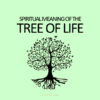
If it doesn’t feel authentic to define yourself by any organized religion anymore, you’re certainly not alone. You might still feel drawn to a spiritual practice, however– this is completely valid!
It’s one hundred percent possible to have a thriving personal spiritual practice, even if you don’t call yourself a Christian, or go to a temple, or read a particular religious text.
In this article, let’s see what it may look like for you to be spiritual, but not religious. Keep in mind, though, that this looks different for everyone. Your practice is yours, and yours only!
What does it mean to be spiritual but not religious?
In essence, to be spiritual but not religious means to not participate in organized religion, but to still maintain some sort of practice of connecting with one’s spirit.
This is a broad definition, because it looks a little different for each individual person. For some, spirituality without religion looks like drawing spiritual knowledge through various religious texts; these people enjoy reading books such as the Bible, Gita etc., but rather than adhering to one particular text, they admire a wide range of texts and still identify with no particular religions.
For others, this could look like meditating and contemplating to draw on their own innate spiritual knowledge. The only way to know if your spiritual practice is “right”, is whether it feels right for you.
Can you be spiritual and not believe in God?
Spirituality does not require a belief in God. At the same time, spirituality can certainly include a belief in God – and that God does not have to adhere to the standards of any organized religion. Spiritual folks define God by themselves and for themselves.
Some spiritual people may be ambivalent about God; perhaps having learned about a punishing God via organized religion, they now come to question whether God exists. Spirituality can still occur in this space of ambivalence. A doubtless belief in God is not necessary.
Those who aren’t sure about their beliefs, or who don’t believe in God, full stop, may still enjoy a rich spiritual practice via connecting with their body, or with nature or by engaging in a myriad of other spiritual activities. It doesn’t take a belief in a higher power to love oneself, to appreciate the magnificence of the human body, or to find beauty in nature.
Can you be spiritual and believe in God?
On the other hand, can you be spiritual and still believe in God? Of course! Again, you define your spirituality.
For example, you may still believe in the God of the organized religion in which you were raised, yet choose not to follow the tenets of that religion. On the other hand, your beliefs of God may fall outside of the scope of any religious definition, and that’s completely valid, as well.
9 Ways to be spiritual without religion
The following are 9 simple ways to be spiritual without religion.
1. Connect with nature
Many spiritual people feel most at one with their idea of God when they’re immersed in nature. Not only is the silence and tranquility of a forest, beach, or garden conducive to deep reflection; you may also find that a connection with the Earth, the trees, or the ocean can connect you to God, Source, the Universe, or whichever term you use for your higher power, if you so choose.
2. Connect with your body
“Connecting with your body” might seem like a vague concept, but it’s one that’s best understood when put into consistent practice. However, this practice can look completely different from person to person. While some appreciate a daily yoga practice, others receive better results from walking or weightlifting.
The idea behind mindful movement, in this case, is to become aware of the way your body feels when you move it. We push ourselves through most of our days ignoring our bodies, but when we are fully in and aware of our bodies (rather than trapped inside our minds), we’re more in touch with Spirit.
3. Spend time alone in self reflection
Do you know what you really want out of this life? Do you know why you want what you want? Do you really know who you are?
The truth is, we learn to live on autopilot; it’s actually often rewarded. We learn to do as we’re told and to strive for whatever external validation presents itself before us in any moment. This is one of the many reasons why we feel unexplainably dissatisfied: we have very little foundational knowledge for listening to our own inner guidance.
When you begin to go within, to ask yourself what you really want, you gradually learn to follow your heart– whether or not you believe in a higher power.
4. Practice journaling
This follows from the above point. It’s fine to self-reflect internally, but many find it easier to keep their thoughts straight (and to determine where those thoughts are coming from!) while writing in a journal.
To do this, you might try journaling on self-reflective prompts (such as these), but it’s not necessary to use a prompt. If you’re an excessive worrier, or an overthinker, try simply writing down what’s on your mind, with no filters. You may find that you become more aware of your thoughts, which allows you to attain a clearer state of mind as a result.
5. Become mindful of your bodily sensations
Body mindfulness goes hand-in-hand with conscious movement; you can’t have conscious movement without body awareness. At the same time, though, you can practice body awareness any time of day, whether you’re moving or stationary.
Are you aware of the temperature of your skin, the quality of your breath, or your overall level of tension or relaxation? An easy way to begin building body awareness is to notice when your muscles tense up: think forehead, jaw, shoulders, and hips. Practice relaxing these muscle groups when they become tight. Before you know it, you’ll find yourself living more in the divine space of your heart and body, and less in the egoic space of your thinking mind.
6. Practice conscious breathing
Thich Nhat Hanh once said, “Feelings come and go like clouds in a windy sky. Conscious breathing is my anchor.”
Try a conscious breathing exercise such as box breathing, and you’ll understand what he means. The box breathing exercise, in particular, has been scientifically proven to lower stress levels; practice it anytime your mind starts to race, and with time, you’ll likely find yourself better able to let those worrisome thoughts drift away– again, just like clouds in the sky.
7. Become conscious of your mind
The rambling thoughts of our “monkey mind”, or our constant mental chatter, separates us from who we are at our core. We internalize voices that we’ve heard our entire lives, and eventually, these voices drown out our deepest truth.
When you become conscious of your thoughts, you start to discern what’s yours from what’s not yours; in other words, you understand which mental voices came from somebody else and are not the truth of who you are.
8. Enjoy creative pursuits
If you enjoy any creative activity– and almost all of us do, whether it’s drawing, writing, cooking, dancing, singing, playing music, or something else entirely– you likely know just how it feels to get lost in your craft. The time flies by, your creations seem to create themselves, and you feel a sense of joyful fulfillment the entire time. In the act of creating, you’ve just connected yourself more deeply to your soul.
Even if you aren’t sure what to create (or you worry that your creations aren’t good enough), you can simply start with something you enjoy! If you love movies, for example, allow yourself to dream up an incredible movie which hasn’t been created yet. Art begins within, long before it’s on the screen or the canvas or the page, and so even allowing yourself to daydream can be an act of creativity.
9. Consider what God means (or doesn’t mean) to you
Finally, you may give yourself the opportunity to discover your own beliefs about the divine; this can feel especially freeing if you grew up in a strict religious culture which discouraged individual questioning or discernment.
Think or journal on any of these questions which resonate:
- Where do you believe you came from before you were conceived?
- Where do you believe you’ll go after you die?
- Where do you believe your thoughts and deepest desires come from?
- Do you feel that some unseen force helps or guides you through your life?
- How do you feel that this force functions, if so?
Remember, as you contemplate, to focus on what you feel, rather than what you’ve been told to believe. Only you can define your own spiritual beliefs, and there is nothing wrong with believing something different than what others believe!
Summing it up
Bottom line is: your spiritual practice is for you. You don’t have to fit your beliefs into any boxes, no matter what you’re told. Additionally, there are plenty of ways for you to connect to your spiritual side without going to a place of worship or reading the Bible. As always, take what works for you, and leave what doesn’t!






